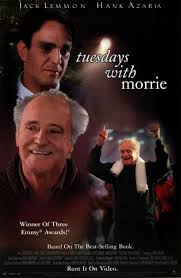
TUESDAYS WITH MORRIE
US, 1999, 85 minutes, Colour.
Jack Lemmon, Hank Azaria, Caroline Aaron.
Directed by Mick Jackson.
Tuesdays With Morrie is based on the writings of Mitch Albon, a university student of Morrie's whom he saw as a mentor and who liked to be called Coach. Albon became a sports commentator and journalist and did not fulfil his promise to keep contact with his mentor. However, when he discovers that Morrie is dying of Lou Gehrig's Disease and has appeared on television to talk about his understanding of life given the imminent experience of death, he goes to see him. The friendship is renewed, Mitch starts interviewing Morrie and recording their conversations. Mitch undergoes a strong change of heart as well as of lifestyle, being able to commit to his girlfriend and realising that a hectic and frantic pace is not everything that he wanted to achieve in life.
Jack Lemmon is Morrie and gives an extraordinarily persuasive performance as the creative sociology lecturer, with a poor New York migrant background (which is visualised in flashbacks) and a sad relationship with his hard father, befriends the student whom he had admired in the past. Since Jack Lemmon died in 2001, this film is something of a last will and testament on screen and makes the audience think back to his extraordinary forty-five year career on screen from Mr Roberts and Some Like It Hot to older more serious films like The China Syndrome and Missing. His partnership with Walter Matthau in many films including The Odd Couple also come to mind.
The film is quite moving, the taped interviews between Mitch and Morrie contain a great deal of wisdom, common sense and a realistic approach to the experience of death. Direction is by Mick Jackson, an English director, A Very British Coup and then, in the United States such as The Bodyguard.
1. The impact of this telemovie? Based on a true story? The testament of Mitch Albon and the last will and testament of Jack Lemmon?
2. Audiences identifying with the ordinary/extraordinary Morrie? His academic life, the flashbacks to his past, his love for dancing, his family, his becoming ill, the television interview, his coping with death?
3. Mitch Albon as a writer, Detroit sports, the media, his pressures for writing columns, doing interviews? The book and the film becoming something of his autobiography? His memories of Morrie, the influence, the promise not kept? His feeling bad while seeing Morrie on TV? The potential for change, for commitment?
4. Mitch and Janine, her singing, her willing to commit to Mitch, his putting things off, wanting to wait? Her deciding to break with him? His anguish, the phone calls, the proposal by letter, the ring? His speaking to Morrie about her and Morrie wanting to meet her? Her agreement, coming to the airport? His watching Janine with Morrie, especially her singing the Gershwin song to him?
5. Morrie and the flashbacks, the portrait of his father, migration, poverty, work, his mother and her death, his stepmother and resisting her, finally realising what a good woman she was, his indebtedness to her? Poverty, work in a factory? Learning from his father not to do things because he had to but rather with a spirit of freedom? His father being hurt in a mugging, his death? Seeing him in his dreams and in imagination as he was dying? A reconciliation with his father?
6. Morrie and his dancing, his joy in life, his collapse? The analysis of Lou Gehrig's Disease and its wasting effect 'dissolving from the inside'? The devotion of his wife, his children? The nurse and her care and friendship with him? Going on the television, accepting his illness and death, learning from it? The exhilaration of having his funeral service with his friends before he died? The increasing pain, his acceptance of the dependence on others for everything? His enjoyment of Mitch's visits, the past falling away and his admiration for Mitch and hoping that he would continue the friendship? Morrie and his aphorisms, comments about the meaning of life, detachment? Nickname Coach? Mitch listening, the effect of the tapes, Morrie's ups and downs? The build-up to his final collapse, his death?
7. Mitch and his having to give his time to Morrie, learning the ordinary caring skills of carrying him, toilet, the scene with the massage and the masseur's explanation of how it cleared Morrie's lungs? Mitch's never crying, his weeping at the funeral? Janine's presence at the funeral?
8. Mitch's skill at his work, his sports commentaries, articles? The editor and the pressure and his resisting him? The young athlete and his scholarship, the press conference? Enthusiasm? His arrest for drug-taking, the media mass pursuing the footballer, Mitch finding himself tripped, on the floor, pursuing the athlete? His quiet discussion with him at the football stadium and promising to do justice by him?
9. The importance of popular films like this about illness and death? Audience identification with characters and themes? With a star like Jack Lemmon in the last years of his own life?